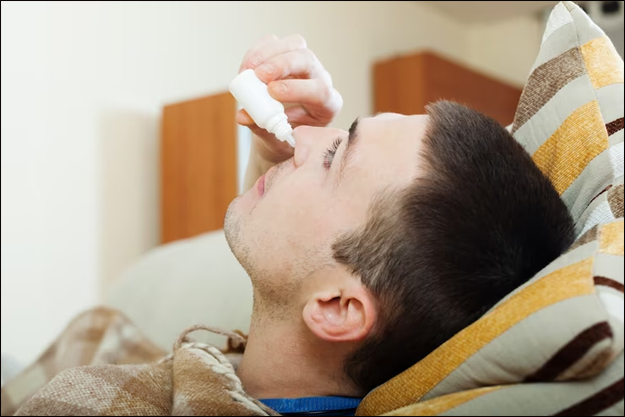What Are Nasal Polyps? Causes, Symptoms And Ayurvedic Treatment
Polyps are non cancerous or benign growth in the body. These polyps can grow in a variety of regions in the body. These polyps when present in the nasal region are known as nasal polyps. This will lead to a narrower passage for the air to pass or for breathing. This scenario will further result in a variety of difficulties faced by the patient. Let us discuss the disease of nasal polyp in detail and also learn about the ayurvedic perspective of the same through the following article.
INTRODUCTION
Nasal polyps are non cancerous types of growth in the nasal passage or sinuses. These are soft and painless most of the time. The nasal polyps may appear similar to the group of grapes hanging on a branch or like teardrops. The nasal polyp can be of varying sizes. The size of the nasal polyp will decide the obstruction it creates. As the polyp larger in size will block the nasal passage to a greater extent and a small polyp will not cause that much of an obstruction. There can be a variety of causes underlying the condition of nasal polyp, which will be described as follows.

CAUSES
There are no exact known causes of nasal polyp till now. A variety of reasons can be comprehended behind the condition of nasal polyp. A history of recurrent infections, irritation or swelling is usually observed in the cases of nasal polyp. Nasal polyp are most commonly seen in young and middle aged adults, but it can occur at any age. There could be various risk factors that make you more prone to the condition such as asthma, vitamin D deficiency, cystic fibrosis, etc. This will result in the presentation of a variety of symptoms which will be discussed as follows.
SYMPTOMS
The nasal polyps cause irritation and swelling in the nasal passage lining. The presenting symptoms will depend on the size of the polyp because the polyp itself is painless and soft. The common presenting features of the nasal polyps will include few or all of the following. Runny nose and snoring are the chief complaints by the patient.
DIAGNOSIS
The doctor will examine your nose to finally make a diagnosis. The proper examination of the nose may require other diagnostic tests also such as nasal endoscopy, CT scan (computed tomography), various allergy tests, blood tests, etc. As soon as a confirmatory diagnosis is made, proper medical treatment must be started.
TREATMENT
The management of nasal polyp in the modern perspective will include administration of various medications such as nasal corticosteroids, oral corticosteroids, or in the form of injectables, If the polyp is not managed through medicinal treatment, one may also be advised for surgical removal of the poly. Let us discuss the ayurvedic perspective of this condition.
AYURVEDIC ASPECT OF NASAL POLYP
The condition of nasal polyp can be correlated with the nasa arsha in the ayurvedic perspective. The nasa arsha is a combination of two words i.e. nasa and arsha. Nasa refers to the nose and the arsha refers to an outgrowth. Arsha, in general, can be understood as piles, when there is a growth similar to piles inside the nose or the nasal passage, it can be referred to as nasal polyp. The occurrence of disease in the body is a result of the vitiation of the dosha of the body. In this condition of nasa arsha, it is considered that the vitiated dosha accumulates in the region of the nose and thus, presents various difficulties. These difficulties may include pratishaya i.e. cold, atimatra kshavthu (Excessive sneezing), kricha uchavasa (dyspnoea or difficulty in breathing), puti nasya (foul odor), etc. This situation can be managed through the administration of various appropriate ayurvedic formulations. These formulations will be described as follows.
HERBAL REMEDIES BY PLANET AYURVEDA FOR NASAL POLYPS
Planet Ayurveda is providing various formulations of natural herbs such as septrin tablets, Kanchnaar guggul, tulsi capsules, etc.These ayurvedic formulations are prepared using authentic ways and provide great results in improving the condition of nasal polyp. The formulations are prepared strictly according to the procedures described in the samhitas (classical texts) and therefore are very effective in promoting the health of the patient and managing the diseased state effectively. The products beneficial for improving the condition of nasal polyp are described as follows
1. Septrin tablets
The septrin tablets prepared by planet ayurveda contain natural herbal extracts such as haldi (Curcuma longa), tulsi (Ocimum sanctum), guggul (Commiphora mukul), etc. This combination of herbs help in improving the immunity of the body, hence fighting off the disease causing pathogen effectively. Septrin tablets help to improve the health of the respiratory system also, thus soothing the breathing difficulties.
Dosage – Two tablets two times a day after meal with water.
2. Kanchnaar Guggul
The kanchnaar guggul tablets prepared by planet ayurveda contains a combination of beneficial ayurvedic herbs such as kanchnar (Boerhavia variegata), amla (Embellica officinalis), cardamom (Elettaria cardamomum), etc. It is useful in subsiding various different types of abnormal outgrowth in the body.
Dosage – Two tablets two times a day after meal with water.
3. Tulsi capsules
Tulsi capsules are being prepared by Planet ayurveda. It contains natural extracts of the very beneficial herb tulsi (Ocimum sanctum). These capsules help to boost the immunity and are very beneficial in improving the health of the respiratory tract also. Tulsi capsules will help to manage nasal polyp and also improve the various associated breathing difficulties faced by the patient.
Dosage – One capsule two times a day after meal with water.
4. Yav Kshar
Yav Kshar is being prepared by Planet ayurveda. It is an alkaline preparation. Yavakshar is used to apply locally on the nasal polyp. It helps to improve the condition of nasal polyp as it is corrosive in nature.This will help in managing the nasal polyp effectively.
Method of application
Take yav kshar on clean cotton or on earbud and apply locally on the nasal polyp once or twice a day.
5. Dashmoola capsules
Dashmoola capsules are being prepared by Planet ayurveda. Dashmool as the name suggests, is a combination of ten beneficial ayurvedic extracts such as bilva (Aegle marmelos), gambhari (Gmelina arborea), etc. which help to improve the overall health status of the body. It mainly acts on balancing the vitiated dosha to improve the condition of nasal polyp.
Dosage – One capsule two times a day after meal with water.
Contact my assistant to provide you the costing / ordering and delivery information at – costing.planetayurveda@gmail.com or call at +91-172-5214030 Or Check Website – www.PlanetAyurveda.com
CONCLUSION
In a nutshell, it can be concluded that following a healthy diet and lifestyle will yield very fruitful results for the health of the individual. The people who are suffering from Nasal polyp and desire a healthy body can include the ayurvedic formulations such as dashmoola capsules, tulsi capsules, septrin tablets, etc. in their daily routine diet. These ayurvedic formulations as described above are very beneficial in managing the various types of nasal polyps and improving the general health of the patient. Thus, useful in improving the general quality of life of the patient .





